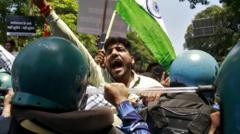The incident, which occurred near the popular resort of Pahalgam, has escalated tensions, prompting Pakistan to expel several Indian diplomats and close its airspace to Indian flights as a retaliatory response. Indian police have implicated three suspects in the attack, identifying two as Pakistani nationals and one as a local Kashmiri, while Pakistan adamantly refutes any involvement.
Prime Minister Narendra Modi has firmly vowed that India will seek vengeance against the terrorists responsible, assuring the nation that the perpetrators and their supporters will face dire consequences. In retaliation for the assault, India has initiated a series of diplomatic actions, including the immediate closure of the Attari-Wagah border and halting visa services for Pakistani nationals.
Amidst these developments, Pakistan has dismissed India's suspension of the longstanding Indus Water Treaty, warning that any attempts to disrupt water flow would be viewed as an act of war. Furthermore, the country has drastically reduced the number of diplomats at the Indian High Commission in Islamabad.
The aftermath of this incident has led to approximately 1,500 detentions in Kashmir as investigations continue. Despite the turmoil, businesses and schools are beginning to reopen following a short shutdown. Nonetheless, the attack has sparked outrage, with victims hailing from various Indian states, including a young naval officer and a tourist guide who supported his family.
Additionally, there are reports of Kashmiri students facing harassment in other parts of India in the wake of the attack, with alarming incidents of intimidation emerging online. As the investigation continues, the families of the victims mourn their tragic losses, highlighting the need for peace in the decades-long conflict between India and Pakistan.
Prime Minister Narendra Modi has firmly vowed that India will seek vengeance against the terrorists responsible, assuring the nation that the perpetrators and their supporters will face dire consequences. In retaliation for the assault, India has initiated a series of diplomatic actions, including the immediate closure of the Attari-Wagah border and halting visa services for Pakistani nationals.
Amidst these developments, Pakistan has dismissed India's suspension of the longstanding Indus Water Treaty, warning that any attempts to disrupt water flow would be viewed as an act of war. Furthermore, the country has drastically reduced the number of diplomats at the Indian High Commission in Islamabad.
The aftermath of this incident has led to approximately 1,500 detentions in Kashmir as investigations continue. Despite the turmoil, businesses and schools are beginning to reopen following a short shutdown. Nonetheless, the attack has sparked outrage, with victims hailing from various Indian states, including a young naval officer and a tourist guide who supported his family.
Additionally, there are reports of Kashmiri students facing harassment in other parts of India in the wake of the attack, with alarming incidents of intimidation emerging online. As the investigation continues, the families of the victims mourn their tragic losses, highlighting the need for peace in the decades-long conflict between India and Pakistan.

















